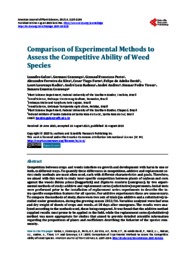Comparison of experimental methods to assess the competitive ability of weed species.
Comparison of experimental methods to assess the competitive ability of weed species.
Autoria: GALON, L.; CONCENCO, G.; PERIN, G. F.; SILVA, A. F. da; FORTE, C. T.; DAVID, F. de A.; RADÜZ, L. L.; RADUNZ, A. L.; ANDRES, A.; TIRONI, S. P.; CONCENÇO, S. E.
Resumo: Competition between crops and weeds interfere on growth and development with harm to one or both, in different ways. To quantify these differences in competition, additive and replacement series study methods are most often used, each with different characteristics and goals. Therefore, we aimed with this work to study interspecific competition between plants of soybean and corn against the weeds Bidens pilosa (beggartick) and Digitaria insularis (sourgrass), by two experimental methods of study: additive and replacement series (substitutive) experiments. Initial tests were performed prior to the installation of replacement series experiments to describe the intra-specific competition features for all species. For additive experiments these are unnecessary. To compare the methods of study, there were two sets of trials (an additive and a substitutive) installed under greenhouse, during the growing season 2013/14. Variables analyzed were leaf area and dry weight of shoots of crops and weeds, at 50 days after emergence. The results were analyzed according to the methods used, these being compared. It was found that the additive method supplied results most prone to be applied in the field, while the replacement series (substitutive) method was more appropriate for studies that aimed to provide detailed scientific information regarding the proportions of plants and coefficients describing the behavior of the species community.
Ano de publicação: 2015
Tipo de publicação: Artigo de periódico
Unidade: Embrapa Agropecuária Oeste
Palavras-chave: Erva daninha, Glycine max, Milho, Planta daninha, Soja, Weeds, Zea mays
Observações
1 - Por padrão são exibidas publicações dos últimos 20 anos. Para encontrar publicações mais antigas, configure o filtro ano de publicação, colocando o ano a partir do qual você deseja encontrar publicações. O filtro está na coluna da esquerda na busca acima.
2 - Para ler algumas publicações da Embrapa (apenas as que estão em formato ePub), é necessário ter, no celular ou computador, um desses softwares gratuitos. Sistemas Android: Google Play Livros; IOS: iBooks; Windows e Linux: software Calibre.
Acesse outras publicações
Acesse a Base de Dados da Pesquisa Agropecuária (BDPA) para consultar o acervo completo das bibliotecas da Embrapa.

